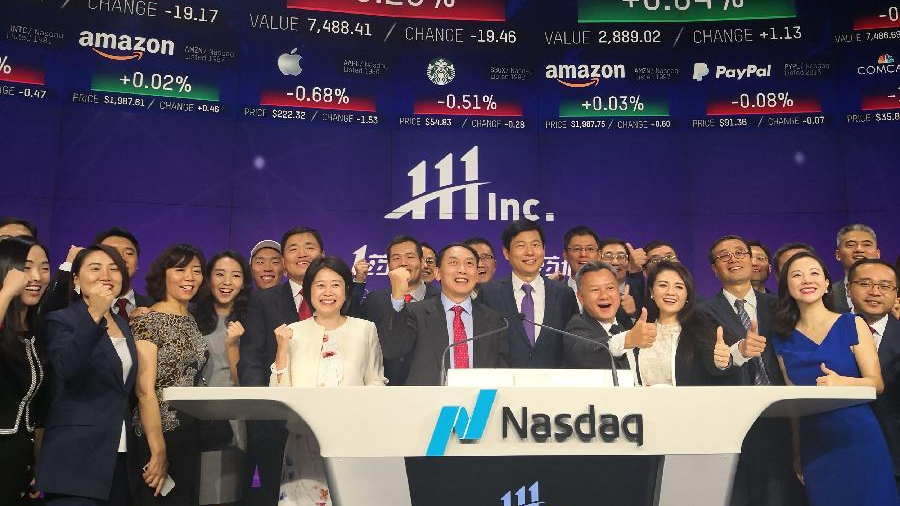Editor's note: Matteo Giovannini is a finance professional at the Industrial and Commercial Bank of China in Beijing and a member of the China Task Force at the Italian Ministry of Economic Development. The article reflects the author's opinions, and not necessarily views of CGTN.
The ever-rising tension between the world's two largest economies shows no sign of stopping as it now concerns every possible area of the relationship between the U.S. and China, ranging from trade to technology, from education to geopolitics.
There is no question that China's impressive growth over the last four decades, as a result of the reform and opening-up policy, has elevated the country to a major player in international markets, leading its rising companies to rapidly become global competitors that now look outside of China's borders for expansion in terms of size and influence.
The possibility for a Chinese startup to get listed through an initial public offering (IPO) in the United States has been for a long time seen as the golden ticket to success for entire generations of entrepreneurs. Chinese companies have been protagonists in the last five years for about a third of the total funds raised globally via IPOs, mostly in New York and Hong Kong.
According to Reuters, the U.S. government is now considering to terminate the agreement signed in 2013 between U.S. and Chinese auditing authorities that has supported Chinese-listed companies in the United States, in something that could potentially lead to a broader crackdown on China's U.S.-listed companies currently under fire for sidestepping America's disclosure rules.
One consideration that could be raised is that the deal in question was signed in May 2013 during the Obama administration as a result of years of negotiations between the two powers that led to a positive outcome in favor of U.S. regulators. This provided the opportunity to access audit documents of Chinese companies while not allowing on-the-ground inspections in China.
At that time, the Public Company Accounting Oversight Board (PCAOB), the non-profit corporation created to oversee the audits of public companies in order to protect the interests of investors, cheered the agreement as a step in the right direction for China-U.S. audit supervision and as an important route toward cross-border cooperation between the two countries.

Yu Gang, co-founder and executive chairman of 111, Inc., and other guests celebrate the initial public offering (IPO) of 111, Inc. on the Nasdaq Stock Market in New York, U.S., September 12, 2018. /Xinhua
Yu Gang, co-founder and executive chairman of 111, Inc., and other guests celebrate the initial public offering (IPO) of 111, Inc. on the Nasdaq Stock Market in New York, U.S., September 12, 2018. /Xinhua
Certainly a lot has changed in the last seven years. China has worked hard to constantly develop itself and to engage more with the rest of the world, while the United States has appeared to slowly lose its position as a global leader at first by provoking the financial crisis in 2008 and then by abandoning the multilateralism that developed after World War II.
In this context, the threat to unilaterally scrap the deal looks more like the result of an arbitrary decision by the current U.S. administration, as well as the difficulties that the United States is facing, to contain China's growth and to maintain its global leadership spot than motivated by national security reasons.
The timing of the announcement by the PCAOB – during the COVID-19 pandemic and after the introduction of the National Security Law for Hong Kong – appears more as an excuse to punish Chinese firms looking for funding to grow their business than a lack of financial transparency, considering that the agreement has been in force for over seven years.
During this period, the U.S. could have asked for a revision or a renegotiation of the deal.
In addition, scrapping the deal saves Chinese companies from having to decide whether to disclose the information requested by the U.S. regulator and break Chinese laws for the risk of exposing state secrets, or to avoid complying with U.S. rules and be delisted from the Nasdaq.
Termination of the agreement will affect the funding strategies of Chinese startups that previously considered a listing on U.S. stock exchanges as a goal. However, it won't necessarily be bad news since China's financial hubs are growing fast through continuous reforms geared toward stronger integration with international capital markets via domestic and international stock connect programs and bond connect programs, and are quickly becoming competitors of well-established Western financial centers.
In this sense, it is highly expected that the immediate valid alternative for the listing of Chinese firms will become Hong Kong – an already world-class financial center and renminbi hub that has recently announced important changes to its 50-year-old benchmark Hang Seng Index, increasing the weight of the ever-growing national high-tech economy – and Shanghai, which has made similar adjustments to its benchmark index and is at the center of the Chinese government's plan to turn the city into a global financial hub.
The threat of the U.S. to terminate the agreement signed in 2013, which will instantly lead Chinese companies to flock back to the Chinese mainland and Hong Kong, will benefit Beijing by strengthening its domestic capital market through the attraction of more financial resources and talents, and speeding up an ongoing opening-up process for foreign investors while elevating the importance of stock exchanges such as Hong Kong, Shanghai and Shenzhen.
(If you want to contribute and have specific expertise, please contact us at opinions@cgtn.com.)